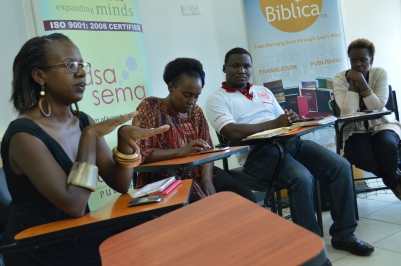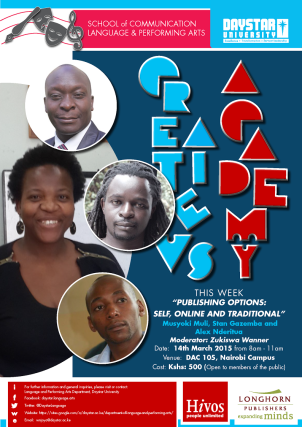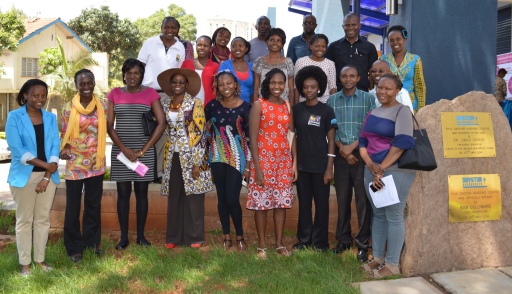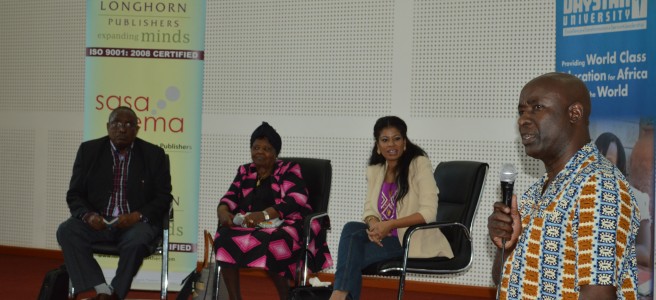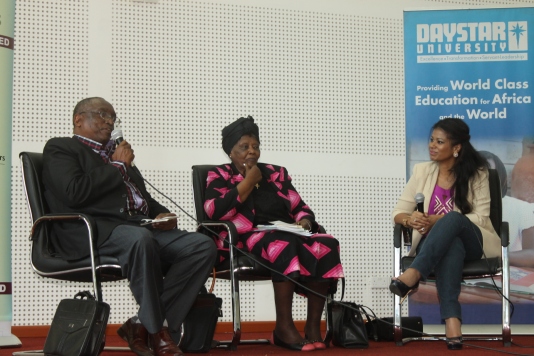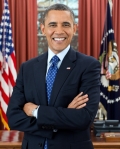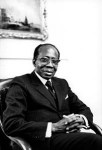Young ladies, young gentlemen, it’s nice to be here. My name is John Sibi-Okumu. I come here as a writer and more specifically, a playwright. My great love throughout the years has been for theatre, which is an emotional space which obliges us to take on identities of other human beings, to pretend to be other human beings. So in the course of this academy, one of the things that is going to become clear is that there are many ways of telling a story. You can decide that you want to be a poet and string words together in such fashion… ‘I love you Julie and you love me, when I see you, I see me’ and everybody will say, “That is a fantastic poem, let’s have it printed.” You can decide that you want to start off with ‘One fine day, the sun was shining, Mr. Kamau got out of bed …’ and string that out for three thousand pages in order to get it printed. Very specific when writing a play, which I will talk about when my big moment comes, is that this are real people, talking real sentences. There is no attempt to obfuscate, this dialogue has to be real dialogue…
I would like to say thank you to Kinyanjui Kombani, specifically, because it is in the amount of time that I have known Kinyanjui that this kind of event has come to be organized. We Kenyans as a group of people are very good at ‘pull him down mentality.’ It comes hand in hand with this idea that if I own my little plot here and it is ten times bigger than your plot there then I will one day come over and buy your plot and make it bigger…that kind of valuing. It speaks to a society which in effect, for my preoccupation as a writer, is not yet, to my mind truly a unified nation. I would sustain that argument for a lifetime but because it is a bit like having a mummy and you know that you love your mummy, but you have to accept that in some way she is not a good cook. You have been to somebody else’s home and somehow somebody else’s mummy ‘karangas’ (fries) very nicely. And your desire as child is that one day mummy will rise to the occasion and cook in a like fashion, learn some skills, to make good sauce. We Kenyans have to work at making a good social sauce and a writer comes in, in a very minuscule, unquantifiable fashion to make people think. All this grandeur statements, whenever I hear fellow writers saying, ‘We writers we are going to change the world.” Well, I don’t think so. I think we are going to change the number of people who expose ourselves to our art.
So the next time I write a play, I wish for you to come and see it. We are into this sort of thing of; I write a play and I write to Dr. Walibora and I am saying, “Ken please come and see my play.” And am writing to Julie and am saying, “Would have time to come and see my play.” Before the play goes on, I have to send at least a thousand emails, 500bobs worth of SMSes to all my chums. When they come, they think that they are doing me a favour. They say, “John you know what, I managed to see Kaggia, it was really good, you should do more of that. I am a banker, I am an industrial developer, I am a chemist … am really too busy, but now that I have managed to come see your play, I thought it’s really nice.”
We have to build a culture where the art is part of our mental skew. Otherwise, we are left behind by other parts of the world where it is part of the skew. Kenyans, I am mean to our society, we have to up our game on a spiritual, soulful level. If we upped our game in that spiritual soulful level, and the cadre here that Julie has brought upon this area, surely this room should be full. Don’t you think? If we had a global view of the opening of Creatives Academy?
I speak a lot. Words are my trade.
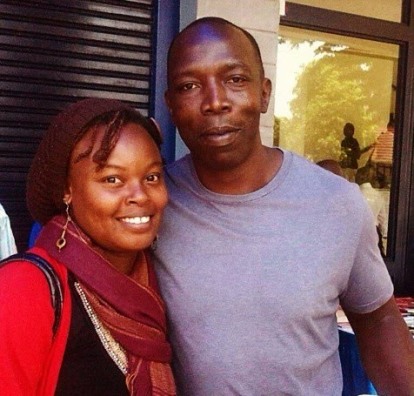 Creatives Academy is the first class I have been to that provides avenues for networking with the moguls in my industry – that of actors, writers, bloggers, poets and media. By the end of an approximate period of twelve weeks, a student rubs shoulders with relevant bigwigs and broadens career prospects.
Creatives Academy is the first class I have been to that provides avenues for networking with the moguls in my industry – that of actors, writers, bloggers, poets and media. By the end of an approximate period of twelve weeks, a student rubs shoulders with relevant bigwigs and broadens career prospects. There are many lessons that we learned when we hosted the first Creatives Academy last year.
There are many lessons that we learned when we hosted the first Creatives Academy last year.